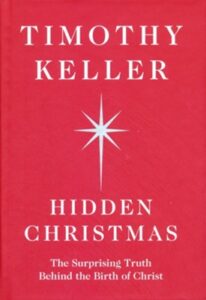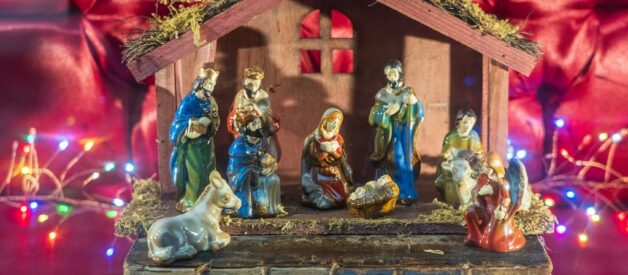
With Christmas approaching, it was the perfect time to pull Hidden Christmas: The Surprising Truth Behind the Birth of Christ by Timothy Keller off my shelf. The title intrigued me. I feel like I’ve known the Christmas story my whole life. Could there be aspects of it that have been hiding from me?
Keller states that our “increasingly secular Western society” becomes more unaware of the basic truths of the Christian faith with each passing year and that if we understand Christmas, we will understand Christianity. Following are several familiar Bible passages about Christ’s birth that Keller expounds on to reveal meanings of Christmas often hidden from us.

“The people living in darkness have seen a great light; on those living in the land of the shadow of death a light has dawned.” (Matthew 4:16)
Matthew was quoting a prophecy from Isaiah that told of the Messiah’s coming. Jesus was born into a dark world. It was evil, full of violence, injustice, and oppression as our world is today. And it was ignorant in that, as much as people tried, they couldn’t cure their suffering because they were looking to themselves for solutions.
Darkness is dispelled only by light, and light cannot come from the darkness. Light must enter darkness from the outside. Jesus, who is “the light of the world” (John 8:12), left heaven to enter our world as a baby, and Light dawned on this dark world bringing “a new life to replace our spiritual deadness, because he shows us the truth that heals our spiritual blindness…” (p.15).
This is the starting point for being able to see the hidden meanings of Christmas.

“1A record of the genealogy of Jesus Christ the son of David, the son of Abraham:… 3Judah the father of Perez and Zerah, whose mother was Tamar… 5Salmon the father of Boaz, whose mother was Rahab, Boaz the father of Obed, whose mother was Ruth… 6David was the father of Solomon, whose mother had been Uriah’s wife… 16Joseph, the husband of Mary, of whom was born Jesus, who is called Christ.” (Matthew 1:1, 3, 5-6, 16)
Matthew begins his account of Jesus’ birth with a genealogy. Jesus’ family tree proves that the Nativity is not just the beginning of an inspiring story. It really happened; Jesus is real. And because of that, it is not giving us advice on what we should do, but it’s a report about what has already been done. We don’t save ourselves; God has already come to save us.
Another revelation from this is that regardless of a person’s pedigree or what he has done, he can be brought into God’s family by the grace of Jesus. In Matthew’s culture, a genealogy was a person’s résumé. Like today, people wrote them to make themselves look good. Women were never included, but Matthew listed five. He also included moral outsiders and people who represented sordid incidents in history. It was not written to impress, but to show that what is important to the world is not important to God.

“22All this took place to fulfill what the Lord had said through the prophet: ‘23The virgin will be with child and will give birth to a son, and they will call him Immanuel’—which means, ‘God with us.’” (Matthew 1:22-23)
In Matthew’s account of the angel appearing to Joseph, he quoted the prophet Isaiah who said Jesus would be called Immanuel. Keller says that name holds three truths for us. One is that Jesus is God. He says if we truly grasp that, we have no choice but to center our whole life on him.
The second truth is that Jesus is human. Because he became one of us, he has experienced every kind of suffering we will ever go through—betrayal, loneliness, abandonment, and more—so he has the power to comfort and strengthen us.
The third idea is that Jesus is with us. That means we can be in his presence, talk with him, and have a relationship with him. He became a human being so he could be near us.

“3When King Herod heard this he was disturbed, and all Jerusalem with him… 16When Herod realized that he had been outwitted by the Magi, he was furious, and he gave orders to kill all the boys in Bethlehem and its vicinity who were two years old and under, in accordance with the time he had learned from the Magi.” (Matthew 2:3, 16)
The Magi came to King Herod seeking “the one who has been born king of the Jews” (Matthew 2:2) so they could worship him. Herod’s reaction to the news was not surprising. He was a most unjust ruler who would go to any extreme to preserve his power. Many see him as the kind of person who represents the source of evil in our world, but Keller says he is a picture of each of us.
Jesus came as King, claiming absolute authority, but the human mind has a natural hostility toward all threats against its self-rule. It isn’t even capable of submitting to God (Romans 8:7). We want to be the center of our world, and we don’t want anyone to tell us what to do. “If the Lord born at Christmas is the true God, then no one will seek for him unless our hearts are supernaturally changed to want and seek him” (p.70).

“9An angel of the Lord appeared to [the shepherds], and the glory of the Lord shone around them, and they were terrified. 10But the angel said to them, ‘Do not be afraid. I bring you good news of great joy that will be for all the people. 11Today in the town of David a Savior has been born to you; he is Christ the Lord…’ 17When they had seen him, they spread the word… 18and all who heard it were amazed at what the shepherds said to them. 19But Mary treasured up all these things and pondered them in her heart. 20The shepherds returned, glorifying and praising God…” (Luke 2:9-11, 17-20)
Keller says Luke didn’t write about shepherds to “evoke lovely pastoral scenes and fluffy little lambs” (p.101). He was trying to teach us how to listen well. One way we do that is to listen to the message itself, regardless of how it comes or who delivers it. The shepherds heard about Jesus from an angel. After they found Jesus in the manger, they told others about him.
Those who heard about Jesus from the lowly shepherds were “amazed” at the news, but we aren’t told that they actually believed because of it. However, the shepherds, who heard of Jesus directly from the spectacular shining angel, returned to the fields “glorifying and praising God.”
Mary reveals more about listening well. She pondered, or thought carefully, about the shepherd’s words so her understanding would increase. She also kept the words alive in her heart, allowing them to change her deeply.

“34Then Simeon blessed them and said to Mary, his mother: ‘This child is destined to cause the falling and rising of many in Israel, and to be a sign that will be spoken against, 35so that the thoughts of many hearts will be revealed. And a sword will pierce your own soul too.’” (Luke 2:34-35)
We hear much at Christmas about the pleasant aspects of Jesus’ coming, such as peace on earth and the light dawning on our dark world. These are wonderful truths, but a lesser known one is found in Simeon’s prophecy to Mary. His message was that peace would not come painlessly. The Lordship of Jesus would polarize people and bring conflict, both among them and within each person.
If we live like Jesus, our lives will expose the dark places in those around us and bring hostility. Individually, we have to go through the pain of admitting our weakness and giving up our self-governance to get to the peace repentance brings. And conflict continues within us between the wills of the old self who wants to rule and the new self who wants to let God be God. Simeon’s prophecy makes clear that we should expect conflict as the way to peace.
I’ve presented thumbnail looks at some of the concepts Keller fully explains in Hidden Christmas. If you have only a vague acquaintance with the Christmas story, the pages of this book will greatly expand your knowledge and understanding. If you are already familiar with the events surrounding the Nativity, it will offer you fresh insights. If you “ponder and treasure” any one of these hidden truths, it is sure to have a huge impact on you.
Scripture quotations are from NIV.
Quotations other than scripture are from Hidden Christmas.
Feature photo by Nick Fewings on Unsplash
Star image by Freepik




Brenda+Murphy
December 2, 2023It’s always good to understand more and to remind ourselves of what really happened. Thanks for taking us deeper into Jesus’ birth. Even though I enjoy all the hoopla and celebration, the bottom line is that Jesus is all that matters. 🙂
bspencer
December 2, 2023You’re welcome, Brenda. That’s so true. May Jesus be right there in all your “hoopla and celebration.” 🙂
Angie Camp
December 2, 2023He gave me a new life…I’m a new creation…I am no longer a sinner (although I occasionally do sin)…the Light of the World is always with us. Thanks for expounding Keller’s thoughts, Angie
bspencer
December 2, 2023You’re welcome, Angie. I love that Jesus is the Light that has come into our world. How hopelessly dark it would be without Him!
marilyn
December 4, 2023Thank you for the powerful insights into the true meaning of Christmas.
Marilyn
bspencer
December 4, 2023You’re welcome, Marilyn. I hope they add something special to your Christmas observance as they have to mine.